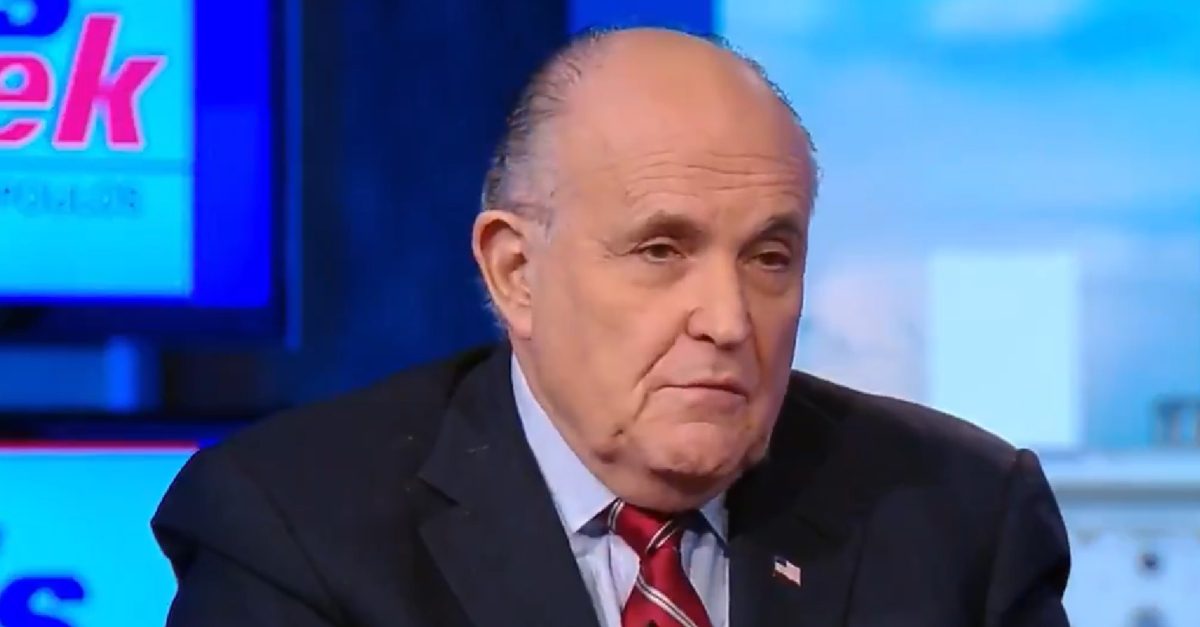
Federal prosecutors seized the emails and messages of a former Ukrainian prosecutor who played a prominent role in Donald Trump’s first impeachment, CNN reported Tuesday. Those same prosecutors in New York are reportedly investigating whether Rudy Giuliani violated federal laws against unregistered foreign lobbying.
The report, which provides new insight into the depth and scope of the probe, was based on a partially-redacted court filings that CNN was able to read in full after copying and pasting the redacted text into a new document.
The document was a letter written by attorney Joseph Bondy, who is representing Ukrainian-born American and former Giuliani business associate Lev Parnas against charges that he committed campaign finance violations and other crimes.
According to the CNN report on the unsuccessfully redacted document, Bondy wrote that prosecutors had seized the electronic communications of Ukraine’s former Prosecutor General Yuriy Lutsenko around November 2019.
The Associated Press later reported the same:
U.S. prosecutors in 2019 sought the electronic messages of two ex-Ukrainian government officials and a Ukrainian businessman as part of their probe of Rudy Giuliani’s dealings in that country, a lawyer accidentally revealed in a court filing Tuesday.
The filing said federal prosecutors in New York had obtained an email account believed to belong to the former prosecutor general of Ukraine, Yuriy Lutsenko.
Additionally, Bondy allegedly attempted to prevent publicly disclosing that federal investigators seized the contents of email or iCloud accounts belonging to Roman Nasirov, the former head of the Ukrainian Fiscal Services, and Alexander Levin, a prominent pro-Trump Ukrainian businessman.
The investigation stems from Giuliani’s alleged role in systematic efforts to oust former U.S. Ambassador to Ukraine Marie Yovanovitch from her position. Those efforts allegedly involved Parnas and his former associate Igor Fruman. Though Lutsenko has since recanted the claim, the then-prosecutor general accused Yovanovitch in 2019 of giving the Ukrainian government “a list of people whom we should not prosecute.” Giuliani has also been accused of leveraging his “pro bono” legal work as Trump’s personal attorney to pressure Lutsenko into signing a lucrative contract with one of the former New York City mayor’s personal businesses. It was not immediately clear why prosecutors were interested in the communications of Nasirov or Levin.
Bondy’s letter asked U.S. District Judge J. Paul Oetken to schedule a status conference on the materials seized when investigators executed search the warrants on Giuliani and pro-Trump conservative attorney and TV personality Victoria Toensing last month.
Bondy described “a chart in which federal prosecutors described the scope of the materials they sought and seized beginning in late 2019 and continuing through earlier this year,” saying that the government had “historical and prospective cell site information” relating to Giuliani and Toensing, per the report.
Bondy allegedly wrote that the material likely produced evidence relevant to his client’s case, including “e-mail, text, and encrypted communications” between Trump, Giuliani, Toensing, and former Attorney General Bill Barr. Others Bondy believed may have also had their communications seized included “high-level members of the Justice Department, Presidential impeachment attorneys Jay Sekulow, Jane Raskin and others, Senator Lindsey Graham, Congressman Devin Nunes and others, relating to the timing of the arrest and indictment of the defendants as a means to prevent potential disclosures to Congress in the first impeachment inquiry of then-President Donald. J. Trump,” the report stated.
The revelations come less than a week after unsealed court documents revealed that prosecutors had seized 18 electronic devices from Giuliani and employees of his firm during the raid on his Manhattan apartment, as well as one device belonging to Toensing.
In that filing, prosecutors cited “unusually sensitive privilege issues” involved in probing the communications of the two lawyers with ties to former President Trump while asking Judge Oetken to appoint a special master to sift through the seized data.
Federal prosecutors’ interest in Giuliani and Toensing’s communications was previously known, but the unsealed portions of the April 29 letter signed by Manhattan U.S. Attorney Audrey Strauss and several assistant U.S. attorneys provided additional details, like the dates and breadth of the government’s search warrants, including “covert” ones from late 2019.
Neither Bondy nor Giuliani’s attorney Robert Costello immediately responded to Law&Crime’s requests for comment.
[image via ABC News screengrab]